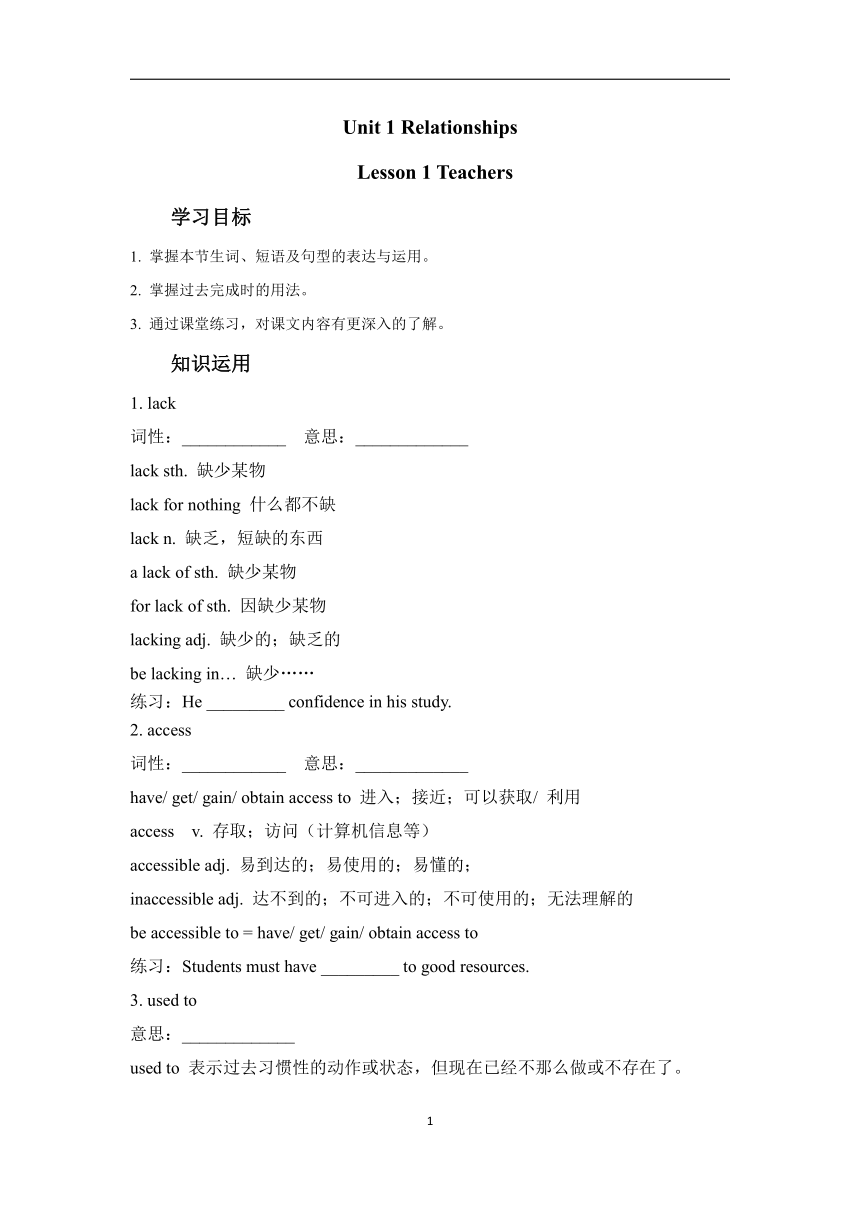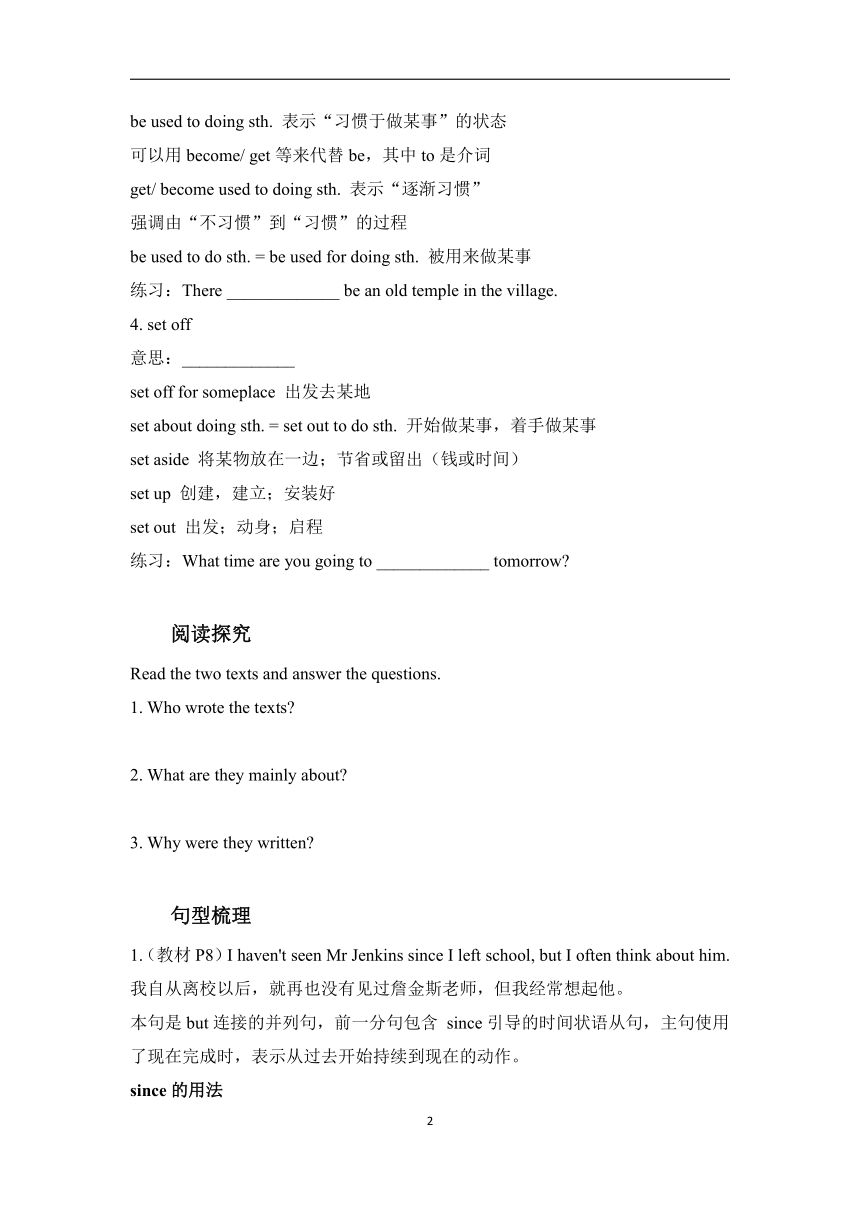北师大版(2019)选择性必修第一册Unit 1 Relationships Lesson 1 Teachers学案-(有答案)
文档属性
| 名称 | 北师大版(2019)选择性必修第一册Unit 1 Relationships Lesson 1 Teachers学案-(有答案) |

|
|
| 格式 | docx | ||
| 文件大小 | 31.0KB | ||
| 资源类型 | 教案 | ||
| 版本资源 | 北师大版(2019) | ||
| 科目 | 英语 | ||
| 更新时间 | 2022-12-02 15:56:34 | ||
图片预览



文档简介
Unit 1 Relationships
Lesson 1 Teachers
学习目标
1. 掌握本节生词、短语及句型的表达与运用。
2. 掌握过去完成时的用法。
3. 通过课堂练习,对课文内容有更深入的了解。
知识运用
1. lack
词性:____________ 意思:_____________
lack sth. 缺少某物
lack for nothing 什么都不缺
lack n. 缺乏,短缺的东西
a lack of sth. 缺少某物
for lack of sth. 因缺少某物
lacking adj. 缺少的;缺乏的
be lacking in… 缺少……
练习:He _________ confidence in his study.
2. access
词性:____________ 意思:_____________
have/ get/ gain/ obtain access to 进入;接近;可以获取/ 利用
access v. 存取;访问(计算机信息等)
accessible adj. 易到达的;易使用的;易懂的;
inaccessible adj. 达不到的;不可进入的;不可使用的;无法理解的
be accessible to = have/ get/ gain/ obtain access to
练习:Students must have _________ to good resources.
3. used to
意思:_____________
used to 表示过去习惯性的动作或状态,但现在已经不那么做或不存在了。
be used to doing sth. 表示“习惯于做某事”的状态
可以用become/ get等来代替be,其中to是介词
get/ become used to doing sth. 表示“逐渐习惯”
强调由“不习惯”到“习惯”的过程
be used to do sth. = be used for doing sth. 被用来做某事
练习:There _____________ be an old temple in the village.
4. set off
意思:_____________
set off for someplace 出发去某地
set about doing sth. = set out to do sth. 开始做某事,着手做某事
set aside 将某物放在一边;节省或留出(钱或时间)
set up 创建,建立;安装好
set out 出发;动身;启程
练习:What time are you going to _____________ tomorrow
阅读探究
Read the two texts and answer the questions.
1. Who wrote the texts
2. What are they mainly about
3. Why were they written
句型梳理
1.(教材P8)I haven't seen Mr Jenkins since I left school, but I often think about him.
我自从离校以后,就再也没有见过詹金斯老师,但我经常想起他。
本句是but连接的并列句,前一分句包含 since引导的时间状语从句,主句使用了现在完成时,表示从过去开始持续到现在的动作。
since的用法
(1)since+时间点
I have stayed in this city since 2, 000.
从2000年开始我就待在这座城市了。
(2)since+一段时间
They have lived in the house since three years ago.
自从三年前以来他们就住在这个屋子里了。
(3)since+时间状语从句
Three months have passed since he moved to this city.
自从他搬到这座城市以来已经过去三个月了。
(4)用于句型“It is/ has been+一段时间+since+时间状语从句”,表示“自从……以来,已经有一段时间了。”
It is/ has been five years since they got married.
他们结婚五年了。
2.(教材P8)Sometimes I think, if only I could call him and ask for his opinion!
有时候我想,要是我能打电话给他,问问他的意见该多好啊!
此句中的if only意为“要是……就好了”,它后面的句子使用了虚拟语气。
if only的用法
if only后的句子中,用一般过去时表示与现在的事实相反,用过去完成时表示与过去的事实相反,用“would/ could/ might+动词原形”表示与将来的情况相反。
与if only用法类似的还有wish
I wish I had known the answer to the question.
我多么希望我那时候知道问题的答案。
I didn't catch the plane. If only I had gone to the airport by taxi.
我没有赶上飞机。要是我乘出租车去机场就好了!
辨析if only与only if:
if only表示“要是……就好了”。
only if是“only+状语从句”位于句首的倒装结构。
If only I had seen the film!
要是我看过这部电影就好了!
Only if I get the job will I have enough money to go to school.
只有我得到这份工作,我才会有足够的钱上学。
3.(教材P9)I think it's important to understand that there's no such thing as a good or a bad student.
我觉得明白没有好学生或是坏学生这类说法是重要的。
此句含有“There is no such…as…”句式。
“There is no such…as…”句式
“There is no such…as...”是固定句式,表示“没有像……的……”。其中的“no such+可数名词单数”相当于“not such a/ an+可数名词单数”。
such与all, no, some, any, few, little, many, much, several, one等词连用时,应置于这些词之后,其后的名词前无冠词,如:no such man, several such rooms.
For the unenlightened people, there is no such thing as study.
对于那些无知的人来说,没有学习这回事。
注意:
(1)such 与a/ an连用时要放在a/ an的前面。
(2)如此……以至于……
such a/ an + adj. +可数名词单数+that…
such + adj. +不可数名词/ 复数名词
(3)such...as...“像……这样的……”,as在句中引导定语从句
语法解析
语法:过去完成时
过去完成时由“had done”构成,其用法如下:
1. 表示在过去某一时间或某一动作之前完成的动作或存在的状态,即“过去的过去”。一般可通过表示“过去的过去”的时间状语(从句)或上下文的语境来判断。
When walking down the street, I came across David, whom I hadn't seen for years.
我走在街上时,碰到了多年没见的大卫。
2. 表示从过去某一时间开始,一直延续到过去的另一时间的动作或状态。
常用的时间状语有:before, by then, by that time, by the end of, by the time等。
It took me a long time before I was able to fully appreciate what they had done for me.
我花了很长时间才能完全理解他们为我所做的。
3. 表示“愿望,打算”的动词(mean, plan, intend, expect等)用过去完成时,表示原本打算实现却未如愿。
I had intended to call on you yesterday, but I had an unexpected visitor.
我昨天本来打算给你打电话的,但不料来了一位客人。
4. 常使用过去完成时的句型:
(1)This/ That/ It was the first/ second/ third…time that…
that从句的谓语动词用过去完成时
This was the first time that they had met in thirty years.
这是他们三十年来第一次见面。
(2)It was+一段时间+since从句
since 从句的谓语动词用过去完成时
It was ten years since we had had such a wonderful time.
自我们曾度过一段如此美妙的时光以来,已经过去十年了。
(3)用于表示“一……就……”的句型中:
Hardly had sb. done…when...did…;
No sooner had sb. done…than...did…
Hardly had she gone to bed when the bell rang.
她一上床睡觉铃就响了。
No sooner had I sat down than there was a loud knock on the door.
我一坐下来就有人大声敲门。
练习:
1. The book which____________ (lose) was returned to the library.
2. It was Monday morning, and the writing class had just ____________ (begin).
3. A rescue worker risked his life saving two tourists who ____________ (trap) in the mountains for two days.
4. The detective fixed his sharp eyes upon the box, wondering whether he ____________ (see) it somewhere before.
5. Silk____________ (become) one of the primary goods traded along the Silk Road by about 100 BC.
6. Just as I got to the school gate, I realized I ____________ (leave) my book in the cafe.
7. Writing out all the invitations by hand was more time-consuming than we ____________ (expect).
答案
知识运用
1. lack 2. access 3. used to 4. set off
阅读探究
1 The texts' writers are Graham Lawrence and Brian Jenkins. Graham was once Mr Jenkins' student.
2 They talk about the memories that they have of each other.
3 The texts were written because the student and the teacher remembered how they influenced each other.
语法解析
1. had been lost 2. begun 3. had been trapped 4. had seen
5. had become 6. had left 7. had expected
2
Lesson 1 Teachers
学习目标
1. 掌握本节生词、短语及句型的表达与运用。
2. 掌握过去完成时的用法。
3. 通过课堂练习,对课文内容有更深入的了解。
知识运用
1. lack
词性:____________ 意思:_____________
lack sth. 缺少某物
lack for nothing 什么都不缺
lack n. 缺乏,短缺的东西
a lack of sth. 缺少某物
for lack of sth. 因缺少某物
lacking adj. 缺少的;缺乏的
be lacking in… 缺少……
练习:He _________ confidence in his study.
2. access
词性:____________ 意思:_____________
have/ get/ gain/ obtain access to 进入;接近;可以获取/ 利用
access v. 存取;访问(计算机信息等)
accessible adj. 易到达的;易使用的;易懂的;
inaccessible adj. 达不到的;不可进入的;不可使用的;无法理解的
be accessible to = have/ get/ gain/ obtain access to
练习:Students must have _________ to good resources.
3. used to
意思:_____________
used to 表示过去习惯性的动作或状态,但现在已经不那么做或不存在了。
be used to doing sth. 表示“习惯于做某事”的状态
可以用become/ get等来代替be,其中to是介词
get/ become used to doing sth. 表示“逐渐习惯”
强调由“不习惯”到“习惯”的过程
be used to do sth. = be used for doing sth. 被用来做某事
练习:There _____________ be an old temple in the village.
4. set off
意思:_____________
set off for someplace 出发去某地
set about doing sth. = set out to do sth. 开始做某事,着手做某事
set aside 将某物放在一边;节省或留出(钱或时间)
set up 创建,建立;安装好
set out 出发;动身;启程
练习:What time are you going to _____________ tomorrow
阅读探究
Read the two texts and answer the questions.
1. Who wrote the texts
2. What are they mainly about
3. Why were they written
句型梳理
1.(教材P8)I haven't seen Mr Jenkins since I left school, but I often think about him.
我自从离校以后,就再也没有见过詹金斯老师,但我经常想起他。
本句是but连接的并列句,前一分句包含 since引导的时间状语从句,主句使用了现在完成时,表示从过去开始持续到现在的动作。
since的用法
(1)since+时间点
I have stayed in this city since 2, 000.
从2000年开始我就待在这座城市了。
(2)since+一段时间
They have lived in the house since three years ago.
自从三年前以来他们就住在这个屋子里了。
(3)since+时间状语从句
Three months have passed since he moved to this city.
自从他搬到这座城市以来已经过去三个月了。
(4)用于句型“It is/ has been+一段时间+since+时间状语从句”,表示“自从……以来,已经有一段时间了。”
It is/ has been five years since they got married.
他们结婚五年了。
2.(教材P8)Sometimes I think, if only I could call him and ask for his opinion!
有时候我想,要是我能打电话给他,问问他的意见该多好啊!
此句中的if only意为“要是……就好了”,它后面的句子使用了虚拟语气。
if only的用法
if only后的句子中,用一般过去时表示与现在的事实相反,用过去完成时表示与过去的事实相反,用“would/ could/ might+动词原形”表示与将来的情况相反。
与if only用法类似的还有wish
I wish I had known the answer to the question.
我多么希望我那时候知道问题的答案。
I didn't catch the plane. If only I had gone to the airport by taxi.
我没有赶上飞机。要是我乘出租车去机场就好了!
辨析if only与only if:
if only表示“要是……就好了”。
only if是“only+状语从句”位于句首的倒装结构。
If only I had seen the film!
要是我看过这部电影就好了!
Only if I get the job will I have enough money to go to school.
只有我得到这份工作,我才会有足够的钱上学。
3.(教材P9)I think it's important to understand that there's no such thing as a good or a bad student.
我觉得明白没有好学生或是坏学生这类说法是重要的。
此句含有“There is no such…as…”句式。
“There is no such…as…”句式
“There is no such…as...”是固定句式,表示“没有像……的……”。其中的“no such+可数名词单数”相当于“not such a/ an+可数名词单数”。
such与all, no, some, any, few, little, many, much, several, one等词连用时,应置于这些词之后,其后的名词前无冠词,如:no such man, several such rooms.
For the unenlightened people, there is no such thing as study.
对于那些无知的人来说,没有学习这回事。
注意:
(1)such 与a/ an连用时要放在a/ an的前面。
(2)如此……以至于……
such a/ an + adj. +可数名词单数+that…
such + adj. +不可数名词/ 复数名词
(3)such...as...“像……这样的……”,as在句中引导定语从句
语法解析
语法:过去完成时
过去完成时由“had done”构成,其用法如下:
1. 表示在过去某一时间或某一动作之前完成的动作或存在的状态,即“过去的过去”。一般可通过表示“过去的过去”的时间状语(从句)或上下文的语境来判断。
When walking down the street, I came across David, whom I hadn't seen for years.
我走在街上时,碰到了多年没见的大卫。
2. 表示从过去某一时间开始,一直延续到过去的另一时间的动作或状态。
常用的时间状语有:before, by then, by that time, by the end of, by the time等。
It took me a long time before I was able to fully appreciate what they had done for me.
我花了很长时间才能完全理解他们为我所做的。
3. 表示“愿望,打算”的动词(mean, plan, intend, expect等)用过去完成时,表示原本打算实现却未如愿。
I had intended to call on you yesterday, but I had an unexpected visitor.
我昨天本来打算给你打电话的,但不料来了一位客人。
4. 常使用过去完成时的句型:
(1)This/ That/ It was the first/ second/ third…time that…
that从句的谓语动词用过去完成时
This was the first time that they had met in thirty years.
这是他们三十年来第一次见面。
(2)It was+一段时间+since从句
since 从句的谓语动词用过去完成时
It was ten years since we had had such a wonderful time.
自我们曾度过一段如此美妙的时光以来,已经过去十年了。
(3)用于表示“一……就……”的句型中:
Hardly had sb. done…when...did…;
No sooner had sb. done…than...did…
Hardly had she gone to bed when the bell rang.
她一上床睡觉铃就响了。
No sooner had I sat down than there was a loud knock on the door.
我一坐下来就有人大声敲门。
练习:
1. The book which____________ (lose) was returned to the library.
2. It was Monday morning, and the writing class had just ____________ (begin).
3. A rescue worker risked his life saving two tourists who ____________ (trap) in the mountains for two days.
4. The detective fixed his sharp eyes upon the box, wondering whether he ____________ (see) it somewhere before.
5. Silk____________ (become) one of the primary goods traded along the Silk Road by about 100 BC.
6. Just as I got to the school gate, I realized I ____________ (leave) my book in the cafe.
7. Writing out all the invitations by hand was more time-consuming than we ____________ (expect).
答案
知识运用
1. lack 2. access 3. used to 4. set off
阅读探究
1 The texts' writers are Graham Lawrence and Brian Jenkins. Graham was once Mr Jenkins' student.
2 They talk about the memories that they have of each other.
3 The texts were written because the student and the teacher remembered how they influenced each other.
语法解析
1. had been lost 2. begun 3. had been trapped 4. had seen
5. had become 6. had left 7. had expected
2
同课章节目录
- Unit 1 Relationshis
- Lesson 1 Teachers
- Lesson 2 How Do We Like Teachers’ Feedback?
- Lesson 3 So Close,Yet So Fa
- Unit 2 Success
- Lesson 1 Money vs Success
- Lesson 2 Top Five Secrets of Success
- Lesson 3 Getting to the Top
- Unit 3 Conservation
- Lesson 1 The Sixth Extinction
- Lesson 2 War on Plastic Packets
- Lesson 3 The Road to Destruction
